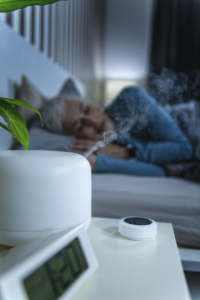Dr. Matthew Olesiak continues to make a significant impact in the medical field through his work at SANESolution and his dedication to evidence-based practices.
Reducing Throat Allergens for Throat Health
Are you tired of constantly battling a sore throat & other frustrating allergy symptoms? End throat allergies and reduce these on the throat allergens list!
Understanding the causes, symptoms, natural remedies, and prevention strategies for throat allergies can help you breathe easier and reclaim your life.
Throat allergens and allergies 101
In this Throat Cleaner and throat health blog post, we dive into the world of throat allergies, providing valuable information on reducing allergens for throat health to help you manage and overcome these pesky irritants. If you want to get even better at helping your throat out then check out our Exercises for a Clear Throat: How to Protect and Improve Your Voice and Benefits of Physical Activity for Vocal and Throat Health guides!

- New Report Says Your Brain Could Be the Key to Reducing Phlegm Over 50
- Doctor's "Leave The Throat Phlegm Behind" Tutorial Goes Viral With People Over 50
- Can You Relieve Throat Phlegm and Coughing In 60 Seconds A Day? This Doctor Says Yes
- How To Banish Phlegm When 50+ (Do This Every Day)
Short Summary
- Understand the causes and symptoms of throat allergies to take control of health.
- Identify common allergens, implement prevention strategies, and use remedies for relief from throat allergies.
- Allergy testing & treatment options such as immunotherapy can provide long-term relief.
Understanding Throat Allergens: Causes and Symptoms
Throat allergies, including seasonal allergies, are caused by various allergens, resulting in symptoms such as postnasal drip and sore throat.
While it may seem like these symptoms are an inevitable part of life, understanding the causes and symptoms of a throat from allergies and viral infections can help you find relief and take control of your health.
Allergic reactions occur when your immune system overreacts to harmless substances like pollen, pet dander, or certain foods.
This overreaction can lead to common allergy symptoms, such as sore throat, itchy throat, coughing, and increased production of mucus. By recognizing these symptoms and identifying their causes, you’ll be better equipped to manage them and prevent future allergic reactions.
Postnasal Drip
Postnasal drip is a condition in which mucus from the nose runs down the back of the throat, resulting in soreness and irritation. This common symptom of throat allergies, including pollen-food allergy syndrome, can be both uncomfortable and frustrating.
The primary cause of postnasal drip is heightened mucus production in nasal passageways and sinuses, which can be triggered by allergic reactions.
To alleviate postnasal drip and the soreness it causes, consider using a saline nasal spray or a neti pot to rinse your nasal passages and relieve congestion.
Common Throat Allergy Symptoms
In addition to an allergic response to postnasal drip, other common throat allergy symptoms include itchy throat, coughing, and excessive mucus production. Recognizing these and other symptoms is essential for proper management and treatment of other allergy symptoms.
It’s also important to distinguish between cold and allergy symptoms, such as coughs, as they can have similar manifestations.
A more common cold or cough typically produces thicker mucus, while an allergy cough is often caused by a tickle in the throat due to post-nasal drip. Knowing the difference between these coughs can help you choose the right treatment and avoid unnecessary medications.
Identifying Common throat allergens beating up your throat
Managing throat allergies starts with identifying common allergens. Some frequent allergens responsible for throat allergies include pollen, pet dander, mold, and dust mites.
By pinpointing the specific allergens that trigger your symptoms, you can take steps to reduce your exposure and alleviate your discomfort.

Pollen Allergies
Pollen allergies, also known as allergic rhinitis, occur when the immune system overreacts to pollen, causing symptoms like sneezing, runny nose, itchy eyes, and throat irritation.
Seasonal changes often bring about an increase in pollen count, leading to heightened seasonal allergy symptoms for many individuals.
To reduce the risk of pollen allergies, it’s important to limit your exposure to pollen, especially during high pollen count days during allergy season. Taking antihistamines and considering immunotherapy can also help manage your symptoms.
Pet Allergies
Pet allergies are triggered by proteins found in an animal’s skin cells, saliva, or urine and can cause symptoms like sneezing, runny nose, itchy eyes, sore throats, and skin rash. The primary cause of pet allergies is dander, or shed skin cells.
To reduce pet allergens in your home, consider using a HEPA air purifier to decrease dander and dried saliva in the air.
Treatment for pet allergies may include antihistamines, decongestants, and corticosteroids. Additionally, maintaining pet hygiene and limiting contact with animals can help prevent pet allergies.
Mold and Dust Mites
Mold and dust mites are common indoor allergens that can cause throat allergies. Mold is a type of fungus that grows in humid environments, while dust mites are microscopic insects that feed on dead human skin cells and thrive in dust.
To reduce the presence of mold and dust mites in your home, maintain low humidity levels, wash bedding frequently, and eliminate dust. By keeping your living environment clean and dry, you can minimize your exposure to these allergens and reduce the severity of your throat allergy symptoms.

Remedies and Treatments for Throat Allergies
In addition to identifying allergens and taking preventative measures, there are several remedies and treatments available to help alleviate throat allergy symptoms. From hydration and warm liquids to over-the-counter medications, these options can provide relief and improve your quality of life.
Hydration and Warm Liquids
Drinking fluids and warm liquids, such as warm water with honey or broth, can help soothe a sore throat caused by allergies. Staying hydrated is essential for overall health, and it can be particularly beneficial in reducing allergy symptoms.
Maintaining proper fluid intake not only helps alleviate throat discomfort but also aids in thinning mucus, making it easier to expel. This can lead to reduced congestion and improved breathing, allowing you to feel better faster.
Humidifiers and Air Purifiers
Utilizing humidifiers and air purifiers in your home can improve air quality and reduce allergens, providing relief from throat allergies. Humidifiers add moisture to the air, alleviating dryness and helping to relieve symptoms like sore throat and congestion.
Air purifiers, on the other hand, work by filtering out airborne particles such as dust, pollen, and other allergens. By maintaining proper humidity levels and purifying the air in your home, you can effectively minimize your exposure to allergens and improve your overall comfort.
Over-the-counter Medications
Over-the-counter medications, such as antihistamines and throat lozenges, can help manage allergy symptoms by providing temporary relief from sore throat, runny nose, and other discomforts. It’s important to choose the right medication for your specific symptoms, as some over-the-counter allergy medications may cause drowsiness or other side effects.
If your symptoms persist or worsen, consult your healthcare provider for further guidance and potential prescription medications, especially if you notice the same or similar symptoms in others around you.

Prevention Strategies for Throat Allergies
Prevention is key when it comes to managing throat allergies. By implementing strategies such as allergy-proofing your home, reducing outdoor allergen exposure, and boosting your immune system, you can minimize your risk of experiencing throat allergy symptoms and enjoy a healthier, more comfortable life.
Allergy-proofing your home involves taking steps such as removing carpets and using air filters.
Allergy-Proofing Your Home
Allergy-proofing your home involves regular cleaning, using hypoallergenic materials, and maintaining proper ventilation. Regular cleaning, such as vacuuming carpets and furniture, dusting, and mopping floors, can help reduce allergens like dust, pet dander, and mold spores.
Using hypoallergenic materials, such as dust-proof covers on pillows, mattresses, and box springs, can also help minimize allergens in your home. Proper ventilation, achieved by opening windows and utilizing fans to circulate air, can further reduce allergens and improve overall air quality.
Outdoor Allergen Reduction
When it comes to outdoor allergen reduction, simple strategies can make a big difference. Staying indoors on days with a high pollen count and changing clothes after spending time outdoors can help minimize your exposure to allergens.
In addition to these measures, consider using a mask when outdoors during peak allergy seasons and showering after being outside to remove any lingering allergens from your skin and hair. By reducing your exposure to outdoor allergens, you can prevent throat allergies and breathe easier.
Boosting Your Immune System
A strong immune system is your best defense against throat allergies. To boost your immune system, focus on maintaining a healthy diet, getting regular exercise, and managing stress.
Incorporating foods rich in beta carotene, vitamin C, vitamin D, zinc, probiotics, and protein can help strengthen your immune system. Additionally, getting enough sleep, practicing relaxation techniques, and avoiding smoking and excessive alcohol consumption can further support your immune system and help prevent throat allergies.
Allergy Testing and Treatment Options
For those struggling with persistent throat allergies, allergy testing and treatment options can provide long-term relief. Allergy tests, such as skin prick tests and blood tests, can help identify specific allergens. Meanwhile, immunotherapy can gradually desensitize the immune system to allergens and alleviate symptoms.
Immunotherapy is a long-term treatment option that can help reduce the severity of the disease.
Types of Allergy Tests
Allergy tests, such as skin prick tests, blood tests, provocation tests, patch tests, and elimination diets, can help identify the specific allergens causing your throat allergies. By pinpointing the allergens responsible for your symptoms, you and your healthcare provider can develop a personalized treatment plan that may include medications, immunotherapy, or lifestyle changes to help manage your throat allergies and improve your quality of life.
Allergy Shots and Immunotherapy
Allergy shots and immunotherapy offer a long-term solution for those suffering from throat allergies. These treatments involve gradually exposing your body to small amounts of the allergen, helping build up immunity and reducing the severity of your symptoms.
Allergy shots are regular injections administered over a period of three to five years, providing sustained relief from allergy symptoms. By desensitizing your immune system to allergens, allergy shots and immunotherapy can help you achieve long-term relief from throat allergies and improve your overall well-being.
Summary
In conclusion, understanding the causes, symptoms, and treatments for throat allergies is crucial in managing your health and well-being. From identifying common allergens and implementing prevention strategies to seeking professional allergy testing and treatment options, taking control of your throat allergies is possible. By staying proactive and informed, you can overcome the discomfort of throat allergies and enjoy a healthier, more comfortable life.
Frequently Asked Questions
How do you control throat allergies?
To control throat allergies, you can try staying hydrated, drinking hot liquids, using a humidifier, keeping your head elevated, taking OTC medications, gargling with salt water, and using throat lotions.
These methods can help reduce the symptoms of throat allergies, such as sore throat, coughing, and sneezing. They can also help reduce inflammation and irritation in the throat.
It is important to consult with your doctor before trying any of these methods, as some may not be suitable for you.
Can allergies cause throat problems?
Yes, allergies can cause throat problems. Research shows that about 20% of people with allergies report a sore throat as a primary symptom. Allergy-related sore throat is typically due to postnasal drip when congestion in the nose runs down the back of the throat.
This reaction is triggered by histamines released by the body after exposure to an allergic trigger.
What causes allergy in throat?
Allergies in the throat are caused by an immune reaction to substances like food, latex, medications, or insect bites/stings. This allergic reaction often leads to inflammation and an itchy sensation in the throat.
How can I reduce my exposure to outdoor allergens?
To reduce your exposure to outdoor allergens, stay indoors on high pollen count days, change clothes after being outside, and wear a mask during peak pollen allergy seasons.
This simple strategy can help reduce your symptoms and make it easier to enjoy the outdoors.
What are some home remedies for throat allergies?
Hydration, warm liquids, and over-the-counter medications are effective home remedies for throat allergies.

Dr. Matthew Olesiak continues to make a significant impact in the medical field through his work at SANESolution and his dedication to evidence-based practices.



